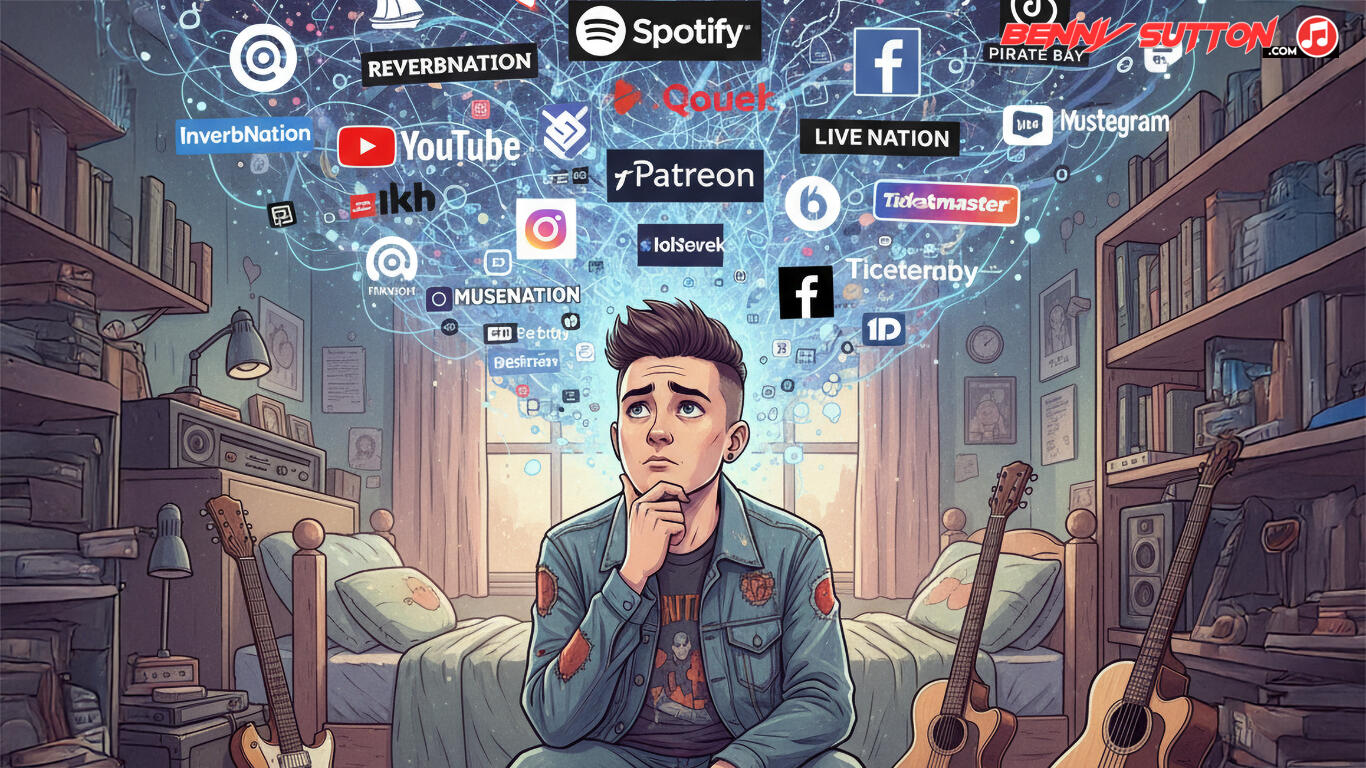Major concert promoter and venue operator; involved in tour production, ticketing partnerships, and festivals.
Live Nation
1. Overview
Live Nation Entertainment is the world’s largest concert promotion and live events company, operating across ticketing, artist management, venue ownership, and sponsorship. Some say it's destroying live music, I agree!
It was formed in 2010 through the merger of Live Nation (a concert promoter) and Ticketmaster (the dominant ticket distributor), creating a vertically integrated monopoly that controls nearly every stage of the live performance pipeline. In other words - rip off!
For musicians, Live Nation can represent both massive exposure and limited bargaining power — they organize the world’s biggest tours, but also dictate much of the live market’s economic terms.
2. Audience & Demographics
| Metric | Value / Insight |
|---|---|
| Annual Attendance (2024) | Over 145 million across 50,000+ events |
| Venues Owned or Operated | ~350 globally |
| Artists Promoted | 5,000+ (from club level to stadiums) |
| Top Markets | North America, Europe, Australia |
| Primary Audience | 18–55, mainstream concertgoers |
| Industry Share | Controls 70% of major venue ticketing via Ticketmaster |
Live Nation’s dominance extends from festival organization to artist management, giving it control over promotion, venues, tickets, and fan data — a full-stack hold on the touring ecosystem.
3. Role in the Music Ecosystem
| Function | Role |
|---|---|
| Promoter | Plans and markets tours, festivals, and arena shows |
| Venue Operator | Owns or leases major performance spaces |
| Ticketing | Integrated via Ticketmaster (its subsidiary) |
| Artist Management | Represents artists via Roc Nation, Maverick, and others |
| Brand Partnerships | Connects artists with corporate sponsors |
Live Nation sits at the core of the global live music industry, bridging corporate sponsorship and fan experience — but its consolidation has sparked antitrust concerns.
4. How Musicians Work with Live Nation
- Major-label or high-profile artists typically sign touring deals that include promotion, logistics, and sponsorship integration.
- Smaller acts often engage indirectly through Live Nation-owned venues or festivals.
- Management and touring divisions handle routing, marketing, and financial risk.
- Artists receive guarantees or revenue splits, depending on their level of draw.
- Festivals like Lollapalooza, Reading & Leeds, and Electric Daisy Carnival are operated or partnered with Live Nation.
Example:
Live Nation managed Beyoncé’s Renaissance Tour and Coldplay’s world tours, coordinating venues, sponsorships, and global logistics through its consolidated ecosystem.
5. Marketing & Growth Strategies
| Strategy | Description | Why It Works |
|---|---|---|
| Dynamic Ticket Pricing | Adjusts ticket cost to real-time demand | Maximizes yield for high-demand shows |
| Sponsorship Bundles | Brand integration (Coca-Cola, Verizon, etc.) | Adds revenue beyond ticket sales |
| Tour Partnerships | Exclusive promoter deals | Streamlined logistics, global reach |
| Data-Driven Targeting | Uses Ticketmaster analytics to forecast sales | Reduces risk on tour investments |
| Festival Ecosystem | Multi-genre festival network | Brand loyalty, scalable promotion |
Artists gain exposure and logistical support, but often surrender creative control and financial transparency in exchange for these resources.
6. Monetization Model
| Source | Description | Artist Impact |
|---|---|---|
| Ticket Sales | Primary and secondary market via Ticketmaster | Artists receive % after fees |
| Sponsorships | Brand deals per tour or venue | Supplementary income |
| Venue Revenue | Concessions, parking, VIP upgrades | Artist share varies |
| Merchandising | In-venue and online sales | Typically 70–80% artist, rest venue cut |
| Management Fees | Live Nation agencies take ~10–15% | Standard industry rate |
| Festival Income | Artist fees negotiated per stage or slot | Wide variance by stature |
A-List artists benefit from guaranteed income (multi-million advances), while emerging acts face pay-to-play scenarios or smaller splits.
7. Etiquette & Risks
| Do | Don’t |
|---|---|
| Review contract clauses carefully | Assume transparency in fee breakdowns |
| Retain independent booking for smaller venues | Depend solely on Live Nation deals |
| Use Live Nation for large-scale logistics | Expect equal terms as headline acts |
| Collect fan data through your own site | Rely on Ticketmaster for audience access |
| Negotiate merch and sponsorship terms early | Sign exclusivity without lawyer review |
Artists often find themselves locked out of their own ticket data, since Live Nation and Ticketmaster treat it as proprietary. Maintaining direct communication channels (mailing lists, social links) is vital for independence.
8. Example Cases & Controversies
| Case | Description | Impact |
|---|---|---|
| US DOJ Investigation (2024–25) | Antitrust scrutiny of Live Nation’s monopoly | Ongoing; could reshape ticketing landscape |
| Artist Complaints | Pearl Jam, Taylor Swift, and others criticized pricing & control | Public backlash |
| Venue Exclusivity | Contracts force venues to use Ticketmaster | Restricts competition |
| Fee Transparency Issues | Bundled fees mislead buyers | Legislative reform efforts underway |
| Festival Consolidation | Smaller promoters absorbed | Reduced diversity in live scene |
Live Nation’s market dominance has drawn political attention — US Congress and UK regulators are investigating whether the merger with Ticketmaster violates fair competition laws.
9. Summary Table
| Feature | Detail |
|---|---|
| Type | Live event promoter and ticketing conglomerate |
| Best For | Large-scale tours, festivals, global logistics |
| Demographic | 18–55, mainstream concertgoers |
| Revenue Model | Ticket sales, sponsorships, venue income |
| Artist Control | Moderate to low, depends on status |
| Average Fees | 20–40% on top of face value (via Ticketmaster) |
| Best Strategy | Negotiate transparency, diversify tour partners |
| Risk | Monopoly practices, hidden fees, limited competition |
